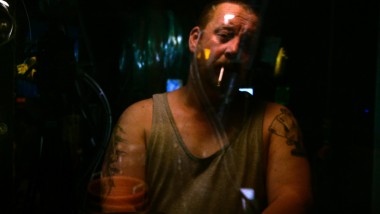| starsza | lista | nowsza |
 LeviathanLeviathan
Festival Spotlight
20 lipca 2013
Festival Spotlight - Leviathan
Marine-based documentaries have come a long way since Louis Malle and Jacques Cousteau immersed themselves in the wonders of the sea in 1956’s The Silent World. Today, most non-fiction films focus on environmental issues, from the depletion of fishing stocks (The End of the Line) and cruelty to animals (The Cove, Black Fish) to the impact of global warming (Chasing Ice, The Island President). However, Lucien Castaing-Taylor and Véréna Paravel’s Leviathan is a very different beast. It is technologically innovative while thematically the film supports cosmologist Carl Sagan’s belief that nature is neither good nor evil, but merely indifferent. An account of life aboard a fishing trawler off the east cost of the US, Leviathan opens with a massive haul of fish being brought on deck. The small crew goes through the motions of gutting the fish, storing them, washing the detritus overboard and preparing the nets to be cast out again. Almost constantly at work, the only time we see any crew members relax is in a shower or drifting slowly off to sleep before a TV in the wreck room. The film was produced by the Sensory Ethnic Lab at Harvard University, which is headed up by Castaing-Taylor, who previously directed the acclaimed Sweetgrass with Ilisa Barbash. The Lab’s remit is to “explore the bodily praxis and affective fabric of human and animal existence, and the aesthetics and ontology of the natural world”. The description is apt for Leviathan, which focuses as much on the marine environment as it does the men who fish it. The result is compelling and quite unlike any other film. The directors make use of small shallow-focus cameras, eleven in all, that are placed all around and beneath the ship. We watch the nets as they are brought out of the water, starfish and smaller sea life falling away into the deep as the catch reaches the ocean’s surface. The images are often stunning and are enhanced by Jacob Ribicoff’s complex sound design, creating a world that is at once chaotic and sublimely beautiful. As documentary it is unconventional, resisting the pull of narrative in favour of a sensorial response to its subject. As such it reflects a question that Castaing-Taylor asks his students at Harvard: ‘If life is messy and unpredictable, and documentary is a reflection of life, should it not be digressive and open-ended too?’ Ian Haydn Smith |
Moje NH
Strona archiwalna 13. edycji (2013 rok)
Przejdź do strony aktualnej edycji festiwalu:
www.nowehoryzonty.pl Nawigator
Lipiec 2013
Szukaj
filmu / reżysera / koncertu
|


















